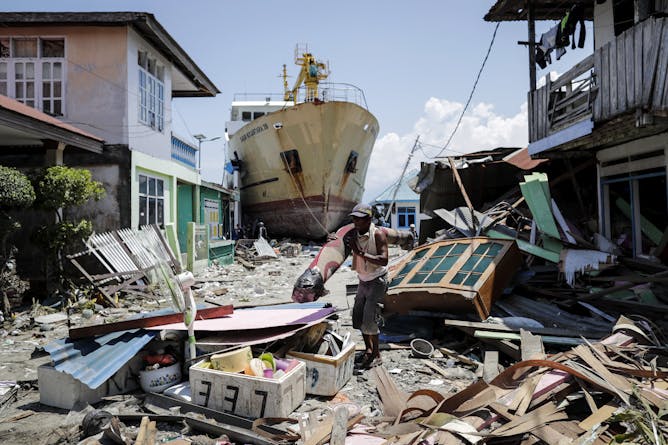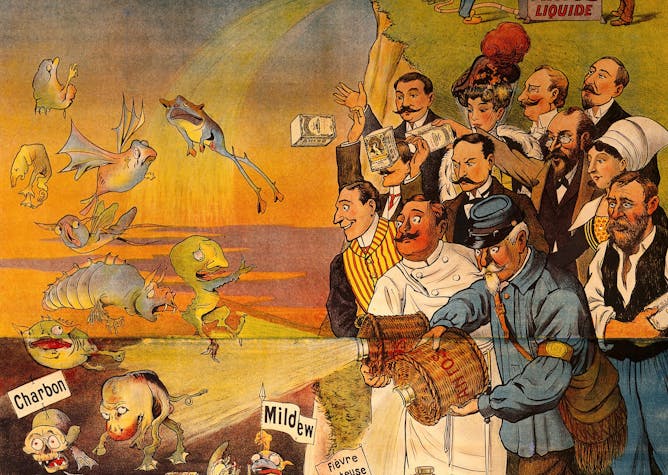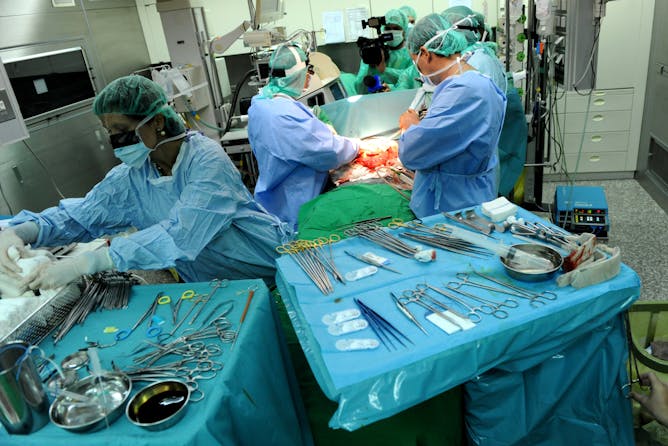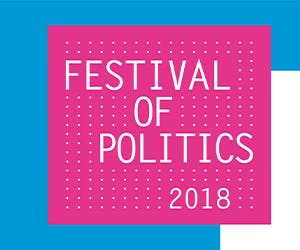|
|
|
Editor's note
|
|
Indonesia suffered mounting devastation this week following an earthquake, tsunami and now a volcanic eruption. At least 1,350 have already died and blame is increasingly falling on the country’s tsunami early warning system. Sue Dawson asks why there has been such a large loss of life, and Jonatan Lassa gives an in depth look at the problems with the warning technology. Meanwhile, Anja Scheffers explains why Indonesia suffers from such powerful tsunamis in the first
place.
If the past few weeks have left you confused about what’s happening with Brexit, you’re not alone. What happens if parliament votes down the government’s deal? And how would a people’s vote really
work? And what’s John Milton got to do with it all?
Humanity’s conception of bacteria has been largely shaped by the images of them that are available to us – images that have, thanks to the market for antibacterial cleaning products, been shaped by advertising. And over the last 170 years advertising has consistently and predictably portrayed bacteria as cute, or sexually deviant. The consequences of this legacy, Norah Campbell and Cormac Deane argue, are worrying.
And from our South African colleagues comes a look at the ethical issues being created by the controversial programme to tackle the country’s dire medical donor shortage by transplanting organs from HIV+ patients.
|
Stephen Harris
Commissioning + Science Editor
|

|
|
Top stories
|

Mast Irham/EPA
Sue Dawson, University of Dundee
The early warning system installed after the 2004 Boxing Day tsunami hasn't lived up to expectations.
|

PA/Aaron Chown
Kenneth Armstrong, University of Cambridge
A change in government could open the path for remaining in the EU. But would it resolve the matter once and for all?
|

Wellcome Collection
Norah Campbell, Trinity College Dublin; Cormac Deane, Dún Laoghaire Institute of Art, Design and Technology
Our view of this essential dimension of earth’s biome has been shaped by the manufacturers of cleaning products.
|

Fundamental questions of ethics are involved in donor transplant decisions.
Shutterstock
Harriet Etheredge, University of the Witwatersrand; Jean Botha, University of the Witwatersrand; June Fabian, University of the Witwatersrand
Doctors in South Africa performed a liver transplant from an HIV-positive donor to a HIV-negative recipient. Major ethical questions came into play.
|
Environment + Energy
|
-
Anja Scheffers, Southern Cross University
A combination of tectonic plates, geography and poor infrastructure make Indonesia vulnerable to deadly tsunamis.
-
Jonatan A Lassa, Charles Darwin University
Indonesia's tsunami early warning system failed to provide adequate warnings to people in Palu.
-
Peter Newell, University of Sussex
The party will eventually have to look beyond economic growth.
|
|
Education
|
-
Alison Scott-Baumann, SOAS, University of London; Simon Perfect, SOAS, University of London
Is controversy extremist? The Charity Commission seems to think so.
-
Gerbrand Tholen, City, University of London
The relationship between higher education and labour market outcomes is overestimated and misinterpreted.
-
Teresa Crew, Bangor University
Having a good degree is not always enough to succeed.
|
|
Politics + Society
|
-
Michael Gordon, University of Liverpool
If the UK does secure a deal with the EU, it's not clear that parliament would back it. Here are some scenarios for what could happen next.
-
Rebecca Nowland, University of Central Lancashire
Social media can be a great tool to keep in touch with friends – but if you are already lonely, it could make things worse.
-
Kia Lilly Caldwell, University of North Carolina at Chapel Hill
In Brazil, a record 1,237 black women will stand for office in Sunday's general election. As in the US, their campaigns reflect deep personal concern about rising racism and sexism in politics.
-
Jak Allen, University of Kent
The longstanding, historical notion of the judge as an independent, non-partisan interpreter of the law may never truly recover.
|
|
Arts + Culture
|
-
Eve MacDonald, Cardiff University
Anything is possible in the world of computers games – except women who fight, apparently.
-
Breeze Barrington, Queen Mary University of London; David Nowell Smith, University of East Anglia
Milton's famous defence of free speech, Areopagitica, was a strange choice for the attorney general.
|
|
Business + Economy
|
-
Iosif Kovras, City, University of London
Ten years on from global crisis, look to a little nation that had some big ideas.
|
|
Health + Medicine
|
-
Alejandra Castanon, Queen Mary University of London
Many countries have swapped Pap smears for the more accurate HPV screening. Why is the UK so far behind?
|
|
Science + Technology
|
-
Andrew Norton, The Open University
A moon has been spotted in a star system 4000 light years away – but its structure is confusing.
|
|
| |
| |
| |
| |

|
| |
| |
| |
Featured events
|

|
Scottish Parliament, Edinburgh, Edinburgh, City of, EH99 1SP, United Kingdom — The Conversation
|

|
East Road, Cambridge, Cambridgeshire, CB11PT, United Kingdom — Anglia Ruskin University
|

|
East Road, Cambridge, Cambridgeshire, CB11PT, United Kingdom — Anglia Ruskin University
|

|
Windsor Building Auditorium, Egham, Surrey, TW20 0EX, United Kingdom — Royal Holloway
|
|
|
|
| |
| |
| |
| |
| |
|
|
|
|
|
|
|